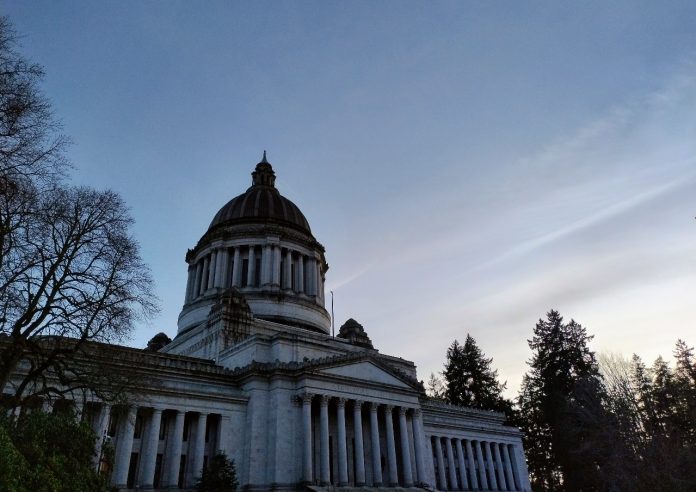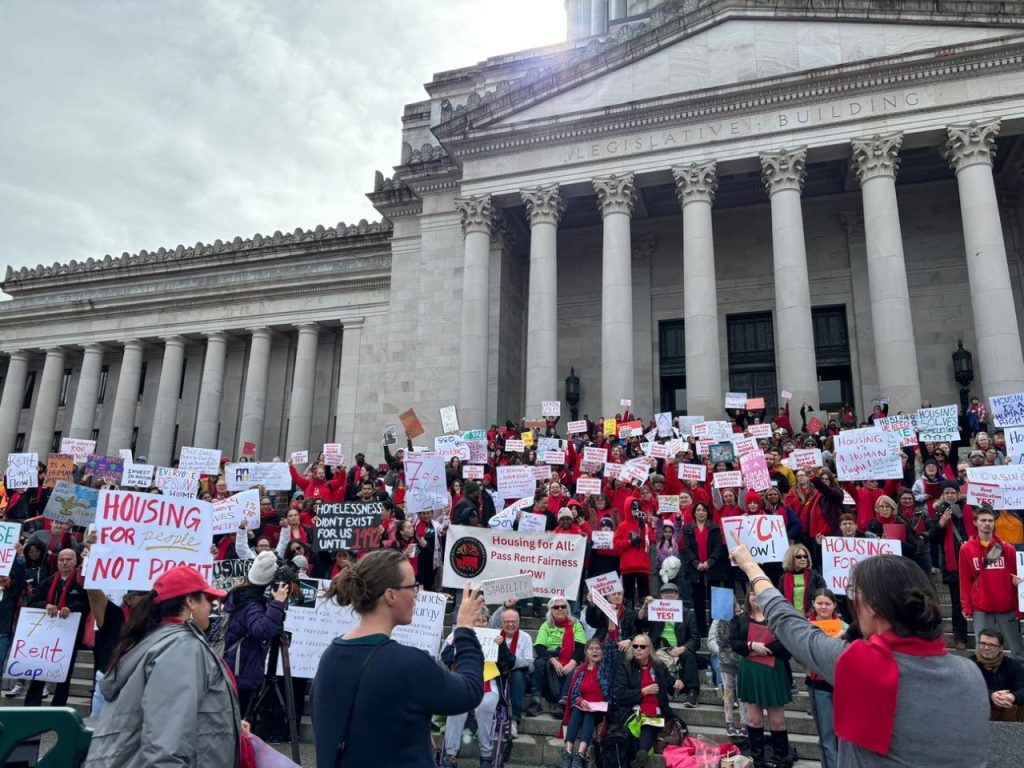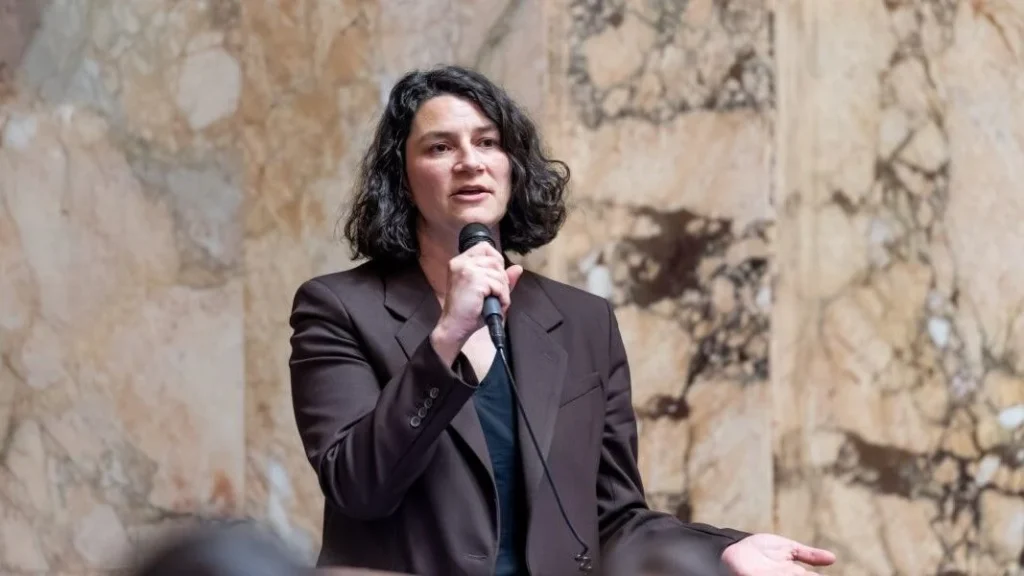
Hours before the end of the state legislative session Sunday, both the Washington House and Senate finally signed off on a bill establishing a statewide annual cap on rent hikes for tenants. A longtime priority for many Democrats in the legislature, rent stabilization turned into one of the most hotly debated bills of the year, and faced a rollercoaster of obstacles over the course of the previous 105 days.
House Bill 1217 was initially introduced by Emily Alvarado (D-34th, West Seattle) with a flat 7% cap, but an amendment on the Senate floor — approved by just a single vote on April 10 — increased that cap to well beyond 10%. That move sapped support from within the House Democratic caucus and made its future uncertain.
However, a compromise measure, approved by a six-member conference committee of legislators from both chambers, produced an outcome everyone could live with: an inflation adjustment on top of the 7% cap, with a hard ceiling at 10%. The inflation adjustment will be set to the Seattle consumer price index, which is calculated by the U.S. Bureau of Labor Statistics.
A 7-10% cap on rent hikes brings Washington in line with states like Oregon, which has had the same policy in place since 2023, and California, where the rent cap can be as low as 5%. Tenants in buildings newer than 12 years old are exempt from the cap, as well as tenants who share a residence with their landlord. Oregon first passed a version of statewide rent stabilization in 2019, before recalibrating in 2023.

This past Friday night, the bill’s future again looked bleak after a rule challenge by Senate Minority Leader John Braun (R-20th, Centralia) sent the bill back into a second conference committee. Braun’s challenge, under Senate Rule 25, concerned the bill’s 58-word title, which references a number of the bill’s elements including a “landlord resource center.” Included in the original version of the bill, that resource center had been stripped out of the bill by the time it passed the House floor, but remained in the title. Lieutenant Governor Denny Heck, presiding over the Senate, ruled in favor of Braun.
But after adding back a provision establishing an online landlord resource center on Saturday morning and waiting a required 24 hours, the bill was back on both the Senate and House floors Sunday morning and was approved relatively quickly. In the end, just seven Democrats across the two chambers voted against the bill. Democrats control 60% of the seats in each chamber, giving them the cushion to pass legislation even with a few defections within the caucus.
The bill now heads to Governor Bob Ferguson’s desk, with Ferguson publicly expressing support for the idea of a rent stabilization framework.
Through final passage, Republican lawmakers continued to argue that implementing rent caps will move Washington backwards when it comes to increasing the state’s housing supply, and incentivize landlords to increase rents annually as a cushion against future cost increases.
“It’s interesting to me that this year’s top priority, the number one bill of the session, the very first day of session in committee, was a bill that’s going to do more harm for supply and more harm for tenants than good. We didn’t do a lot of supply-side bills this year,” Representative Andy Barkis (R-2, Yelm) said Sunday. “It’s difficult when policy is developed steeped in ideology and devoid of data.”
Barkis’s remarks weren’t confirmed by the facts on the ground, with the legislature approving a laundry list of housing supply bills this session. Those included a parking reform bill, a sweeping transit-oriented development bill, a bill reforming historical landmark laws, condominium liability reform and building code reform. Even before the session kicked off, Democratic leaders had been adamant that rent stabilization had to move forward with supply reforms.

“We can stop price gouging. We can also build homes. We can do both at a time when young adults have few opportunities to afford to buy homes,” Senator Alvarado said Friday night. After introducing the bill in the House late last year, Alvarado was appointed to the Senate and shepherded the bill through the other chamber.
“They’re locked out of the benefits of home ownership that so many people in this chamber benefit from,” Alvarado continued. “They too, can get some predictability and stability as renters at a time when people worry whether they will lose their federal benefits, whether they will lose their federal housing choice vouchers or health care benefits, we can help assure them that here in Washington, you won’t face an excessive rent hike.”
Lieutenant Governor Heck, a major cheerleader on housing issues, declined to embrace the compromise that advanced across the finish line Sunday in an interview with TVW.
“I’m optimistic that it’s going to keep some people from being price gouged by that minority of landlords who would be inclined to engage in that practice. On the other hand, I’m concerned about what it might do to the flow of capital into the construction of additional housing,” Heck said, referencing the transition report he helped to craft for Governor Ferguson on housing issues.
“Our indication was that protection against price gouging had to be done in a balanced way, but in combination with a bunch of stuff to increase supply to reduce that shortage,” Heck said. “And they did do a bunch. Whether or not it was enough… [is] to be determined.”
Ryan Packer has been writing for The Urbanist since 2015, and currently reports full-time as Contributing Editor. Their beats are transportation, land use, public space, traffic safety, and obscure community meetings. Packer has also reported for other regional outlets including Capitol Hill Seattle, BikePortland, Seattle Met, and PubliCola. They live in the Capitol Hill neighborhood of Seattle.


